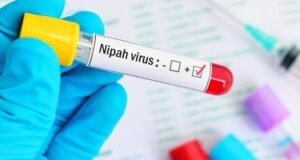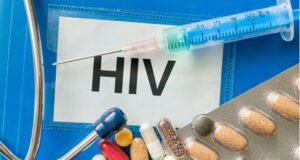 The first British healthcare worker who caught and survived Ebola is working as an NHS nurse in the hospital that helped save his life.
The first British healthcare worker who caught and survived Ebola is working as an NHS nurse in the hospital that helped save his life.
He spoke to the BBC while working nights in A&E at the Royal Free Hospital in north London.
In an exclusive interview, Will Pooley said everyone should “honour and remember” the African healthcare staff who fought the disease.
He was flown back to the UK from Sierra Leone in an RAF airlift a year ago.
Mr Pooley, 30, spent a week in a special isolation unit at the Royal Free, where he was treated with the experimental drug ZMapp.
He recovered quickly and returned to Sierra Leone in October to help efforts to contain the virus, which has claimed more than 11,000 lives in West Africa in the past year.
The latest figures from the World Health Organization show there have been just three new Ebola cases in the past week – all from Guinea.
Mr Pooley has been at the Royal Free for about three months. I accompanied him as he returned to the unit where he began his admission by crawling to his bed through a plastic tunnel.
Two separate rooms each contain a bed surrounded by plastic tents. The unit is, in effect, a self-contained hospital.
Mr Pooley told BBC News: “It feels like a lifetime has passed since I was here, and I’m grateful to be alive.
“But my whole year has been coloured by the death, shortly after my discharge, of a nursing sister and colleague in Africa, Nancy Yoko.
“I know what treatment I received because of where I’m from. She died a really unpleasant death.
“She and a clutch of other staff there died protecting all of us from Ebola.
“Their story has been lost in some ways. We should remember them and honour them.”
He paid tribute to his “compassionate and skilled” colleagues in A&E, saying he was “emotionally connected” to the Royal Free after his Ebola treatment.
He added: “I bump into nurses in the lift who, a year ago, were saving my life.”
________________________________________Over 11,000 people have died from Ebola since the epidemic erupted in 2014 – a six-fold increase of victims since its discovery in 1976.
The World Health Organisation declared the outbreak an international emergency on 8 August 2014 – more than seven months after it began.
Some scientists say there’s a risk the virus may become an ever-present disease in West African society.
The nurse believes he caught Ebola from changing a baby’s nappy.
He was critical of the slow start to the global effort in tackling last year’s outbreak.
He said: “I’ve heard Barack Obama and David Cameron talk about how slow and inadequate the response was to start with.
“Ultimately we ended up paying the price for that.
“We had to commit more resources for something that could have been nipped in the bud earlier on.
“And even if we’re solving problems for selfish interests – to save trouble further down the line – we also have a moral responsibility to help.”
Some Ebola survivors have experienced problems such as joint pain and sight difficulties.
Mr Pooley was not exposed to levels of the virus which gave him lingering effects, but said it was a problem for a “substantial minority” of people.
As he prepared for a series of night shifts in a packed A&E, he acknowledged his life would never be the same again. “I’ve been busy working nearly the whole time.
“I keep myself occupied and don’t allow things to play on my mind too much.
“I’ve got a great job and I’m living in a great city.
“But I still think about Sierra Leone, and the colleagues and friends we lost to Ebola.”
Two other nurses – Pauline Cafferkey, from Glasgow, and Army reservist Cpl Anna Cross, from Cambridge, – also needed treatment for Ebola in the special facility, the only permanent one of its kind in the UK.
The infectious diseases consultant who treated all three nurses, Dr Michael Jacobs, told me: “It’s a huge moment for us when we take the patients out of the tent.
“It’s the first time we can look after them directly, shake their hand and hug them.
“It’s often very disorientating for them in the first day or two, before they readjust to being back out and free again.”
Mr Pooley was appointed an MBE in the Queen’s Birthday Honours.
In July, he attended a Downing Street reception held to honour the 3,000 people receiving a medal for their work in tackling the lethal virus.
The unit at the Royal Free has now been empty for five months – a sign of the world’s success in eventually bringing Ebola under control.
But it remains ready, around the clock, to receive patients with dangerous infectious diseases.
 Weekly Bangla Mirror | Bangla Mirror, Bangladeshi news in UK, bangla mirror news
Weekly Bangla Mirror | Bangla Mirror, Bangladeshi news in UK, bangla mirror news







